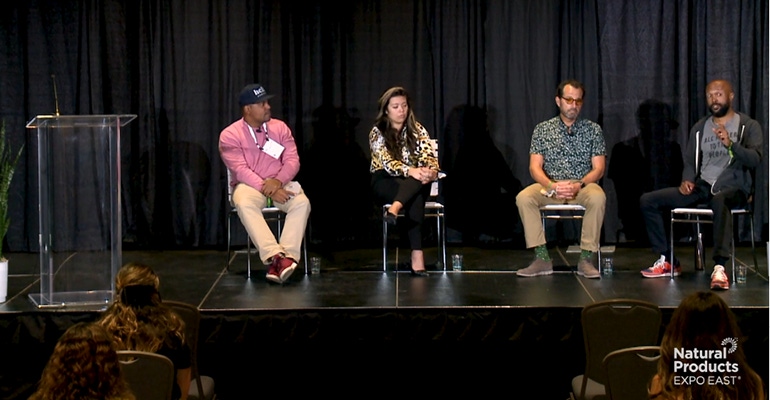October 1, 2021

Contemplation. Self-reflection. Acknowledgement. Pain.
While the Black Lives Matter movement seemed like an inflection point for the natural products industry, leading voices urged consumers to remain skeptical, take stock and ask the hard questions. This is a moment we are called to action: a collective call for progress.
At the Natural Products Expo East 2021 session entitled George Floyd: An Industry Report Card on Progress, BIPOC CEOs in the consumer packaged goods industry brought truth to the table and discussed supporting each other, advocating for their needs and being true change agents. (Dec. 27 editor's note: The replay is not currently available.)
“I wonder openly, somewhat skeptically frankly, how much of this commitment, focus and intention is actually going to convert into a real manifestation of antiracism commitment and change,” said Ryan Pintado-Vertner, founder of boutique consultancy firm Smoketown.
It all starts with understanding and listening
If there's one positive thing that arose out of the horrific events of last June, it's awareness. That’s the first step. Panelists agreed that consumers and all members of the natural products industry need to do self-assessment work.
“There’s a propensity after events like this to move to segregated activity when the goal should be unifying,” said Ayeshah Abuelhiga, founder and CEO of Mason Dixie Foods. “If all of us came together as diverse people and allies of diverse people, there wouldn’t be a need to keep doing this this way. I’m looking forward to a moment where there is a more unified voice, instead of us vs. them.”
While the activity may be in motion, Pintado-Vertner stressed that bureaucracy is in the way. Yet leaders in the CPG industry need to be the changemakers that push others forward. When the fervor and passion has evaporated, how do we keep the movement alive?
“We started writing manifestos about what we wanted to see the world look like in the immediate future. It starts with understanding and listening,” said Jomaree Pinkard, CEO of Hella Cocktail Company.
Growing access and opportunity to get on shelf
Bureaucracy is inherently racist because it is founded on allowing the status quo more and more time to sustain itself. Simply put: You are either antiracist or racist. Because the entire CPG industry is shaped by large players, Abuelhiga wanted a place for people of color to access resources, community and career development opportunities.
In founding Project Potluck, Abuelhiga has helped BIPOC entrepreneurs build successful companies and careers in the CPG industry. Their yearlong mentorship program uses a small group format to connect participants with both experienced mentors and industry peers. It has expanded the number of BIPOC brands that have the ability to enter the space, which is the real foundation of measurable progress.
“The real opportunity is generational wealth creation. That opportunity needs to be broadly available—including access to money, programs, the shelf and consumers—all of it is tied together,” said Elliot Begoun, founder of TIG Brands. “If we can open those lanes, we create a path to investment and wealth building. We need a real, sustainable pathway for founders to build that wealth.”
Where progress can happen
In order to make lasting change in the natural products industry, the BIPOC community needs to be integrated into the overarching story and shift from segmentation to unification. Most brands with a founder of color build wealth through small businesses. The industry also needs to train people of color how to pitch; until we see representation in the VC world, this cannot happen.
For current angel investors, turn donations into an investment. Many BIPOC brands are not coming in with the same resource allocations. For many founders, it is about simply starting in the game. We must amplify the voices and the narrative, giving them not only placement on shelf but the opportunity to succeed in their home communities.
“Normalize our narratives; once you normalize a narrative, all of these things feel normal. If you don’t hear their stories, it never rings a bell and the seeds are never planted,” said Pinkard. “Amplification of stories is key. Our stories are not normalized. Until that piece is unlocked, these other things don’t have a shot.”
(Dec. 27 editor's note: The replay is not currently available.)
 Watch the replay
Watch the replay

The Natural Products Expo East 2021 session George Floyd: An Industry Report Card on Progress is available for replay in the Natural Products Expo Virtual community platform.
About the Author(s)
You May Also Like





